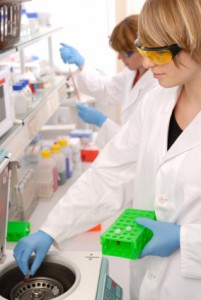
I wondered what “thanksgiving” looks like to the research scientist. So I asked:
What are the things you are thankful for in science?
The answers have been as varied as the people I talked to ranging from little things like water bath floats to really big things, like the renewal of your research funding or achieving tenure.
Here are some of the answers from my informal inquiries:
“Tube floaties for water baths.”
—E.V., genomics product manager
“I was always thankful for Geiger counters.”
—K. G., science writer
“Thermal cyclers and Taq Polymerase. As an undergrad I watched someone sit with a timer and move their tubes between water baths at 3 different temperatures, opening tubes and adding polymerase at the end of each cycle. Modern PCR is SOOO much easier.”
—M.M., research scientist
“I am thankful for competent cells. I remember preparing the CaCl2 and doing slow centrifugation. Also thankful for serum-compatible transfection, rapid ligations and online journal access (no longer have to traipse over to the university library to get papers photocopied- uuurrrgggghhh).”
—R.D., technical services scientist
“How about T-vectors for cloning? I was no molecular biologist, but could make a T-vector work.”
—K.K., science writer
“I am thankful for open-access journals and the ability to read the full article without an institutional subscription.”
—S.K., science writer
“I am ever so thankful for ONLINE ORDERING! So awesome. Throw in online technical manuals, on-line support tools, on-line calculators – all are awesome!!”
—A.P., director, scientific courses
“I am thankful for automated sequencing- manual sequencing was laborious and hazardous!!!”
—R.G., technical services scientist
Do any of these resonate with you? What are you thankful for as a scientist? Let us know in the comments.
Michele Arduengo
Latest posts by Michele Arduengo (see all)
- IL-6/STAT3-Regulated Long Non-Coding RNA Is Involved in Colorectal Cancer Progression - July 1, 2025
- Using Dual-Luciferase Assays to Identify the Role of Non-Coding RNAs in Disease - May 2, 2025
- An Unexpected Role for RNA Methylation in Mitosis Leads to New Understanding of Neurodevelopmental Disorders - March 27, 2025
